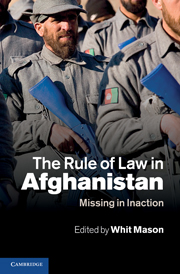Book contents
- Frontmatter
- Contents
- Contributors
- Preface and acknowledgements
- 1 Introduction
- PART I The scope and nature of the problem
- 2 Approaching the rule of law
- 3 Deiokes and the Taliban
- PART II The context
- PART III The political economy of opium
- PART IV Afghan approaches to security and the rule of law
- PART V International interventions
- PART VI Kandahar
- PART VII Conclusion
- Index
- References
2 - Approaching the rule of law
Published online by Cambridge University Press: 01 June 2011
- Frontmatter
- Contents
- Contributors
- Preface and acknowledgements
- 1 Introduction
- PART I The scope and nature of the problem
- 2 Approaching the rule of law
- 3 Deiokes and the Taliban
- PART II The context
- PART III The political economy of opium
- PART IV Afghan approaches to security and the rule of law
- PART V International interventions
- PART VI Kandahar
- PART VII Conclusion
- Index
- References
Summary
In a way, rule of law promotion is booming. A lot of people and organisations are contracted to work on it, a lot of money is spent on it, a lot of academics study it. And yet it is hard to boast of much success in actually fostering it, much less conjuring it ex nihilo or next to nihilo.
That should not be surprising. The rule of law is not a natural fact but a rare achievement, and there are many forces that militate against it. And Afghanistan is not the easiest place to start.
It is not at all clear, however, whether such ‘hard facts’ are the only source of our problems. Some, at least, derive from limitations we bring to the world. To put it bluntly, and fortunately in the words of another: in the business of rule of law promotion, ‘we know how to do a lot of things, but deep down we don't really know what we are doing’.
The authors in this book have a lot to tell us about the quest for the rule of law in Afghanistan; what is going on, what has been attempted, what was wise, what was stupid, what has failed, what has succeeded. They alert us, again and again, to facts that need to be recognised and often have not been, and to specific tactics and strategies, well or ill adapted to those facts.
- Type
- Chapter
- Information
- The Rule of Law in AfghanistanMissing in Inaction, pp. 15 - 34Publisher: Cambridge University PressPrint publication year: 2011
References
- 4
- Cited by

